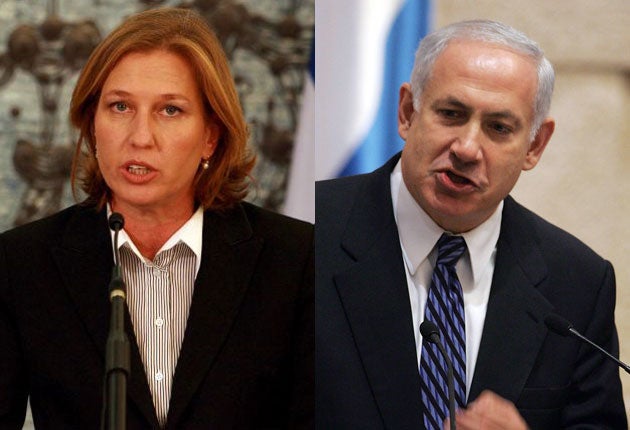Chance for Netanyahu as Livni talks collapse

Your support helps us to tell the story
From reproductive rights to climate change to Big Tech, The Independent is on the ground when the story is developing. Whether it's investigating the financials of Elon Musk's pro-Trump PAC or producing our latest documentary, 'The A Word', which shines a light on the American women fighting for reproductive rights, we know how important it is to parse out the facts from the messaging.
At such a critical moment in US history, we need reporters on the ground. Your donation allows us to keep sending journalists to speak to both sides of the story.
The Independent is trusted by Americans across the entire political spectrum. And unlike many other quality news outlets, we choose not to lock Americans out of our reporting and analysis with paywalls. We believe quality journalism should be available to everyone, paid for by those who can afford it.
Your support makes all the difference.Tzipi Livni, the leader of Israel's ruling Kadima party, broke off efforts to form a coalition government yesterday, opting instead for a gruelling electoral contest against the hardline leader Benjamin Netan-yahu and his Likud party.
Palestinians are worried that crucial peace talks will now languish in limbo until the new elections – which would be held in February or March – and that if Mr Netanyahu wins, they could collapse altogether.
Ms Livni has turned her refusal to hold further coalition negotiations into an opening shot of the campaign, using it to cast herself as a clean, principled foil to the caretaker Prime Minister Ehud Olmert, who stepped down from party leadership amid corruption scandals in September.
"When it became clear everyone and every party was exploiting the opportunity to make demands that are politically and diplomatically illegitimate I decided to call off [talks] and go to elections," Ms Livni said.
She was referring to demands by the ultra-orthodox Shas party to increase child allowances, important to its lower-income constituency. Shas, with 10 per cent of the Knesset and a linchpin for Mr Olmert's government, had also asked for guarantees she would not engage in talks with the Palestinian Authority on Jerusalem's future. The city's eastern part is earmarked by Palestinians as their state's future capital.
Claiming Kadima had "proven it does what is right", Ms Livni must now do battle with Mr Netanyahu, who brought the Oslo peace process to a near-halt as prime minister from 1996 to 1999. He has not softened his views since then. They are level in the personal popularity stakes but the right-wing bloc Mr Netanyahu heads is leading in the polls.
Analysts expect the campaign to focus on security. "Generally, people today understand the depth of hostility towards Israel but on the other hand, the belief in Greater Israel is over. If she can prove she is aware of the dangers but at the same time bring a secure settlement, that will help her a lot," said Avraham Diskin, a political scientist at the Hebrew University of Jerusalem.
Nabil Abu Rudeineh, a spokesman for the Palestinian President, Mahmoud Abbas, voiced concern that Israel's political turmoil would damage the peace process. "Time is precious. The next few months could be wasted because of new elections and US elections," he said. And Hamas, which controls Gaza, called the snap elections "a slap in the face to those seeking a peace settlement".
Ms Livni served as a chief negotiator during US-sponsored peace talks, relaunched last November.
If she wins, Ms Livni will be the first Israeli woman premier since Golda Meir. She has said repeatedly she supports a Palestinian state. She believes it is in Israel's interest because annexing the West Bank Palestinian population would call into question Israel's demographic character as a Jewish state. Her opponent's likely approach is shown in Likud's campaign posters for next month's Jerusalem municipal elections. They show an earnest-looking Mr Netanyahu, and promise Likud will "safeguard Jerusalem".
Parliamentary elections had not been due until 2010. Commentators have identified 17 February as a likely date. Until then, Mr Olmert will stay in office. "It is not a happy announcement," the Prime Minister said about Ms Livni's decision.
Mr Olmert has said he would use his remaining days to try to achieve a peace breakthrough with the Palestinian Authority or Syria. In a recent interview, he called for giving up almost all of the occupied West Bank and East Jerusalem and all the Golan Heights taken from Syria in 1967 in exchange for peace agreements.
A peace deal might be in Ms Livni's interest, since she could turn the election into a de facto referendum. The risk, however, is that it could be depicted as a political stunt at the expense of Israel's security.
The rivals Fighting for power in Israel
Tzipi Livni
*Born in Tel Aviv on 8 July 1958
*Former Mossad operative, Israel's second woman Foreign Minister and currently chief peace negotiator with the Palestinians
* Elected to Knesset as a member of Likud in 1999, she then became one of Kadima's founding members alongside Ariel Sharon in 2005
*Won a razor-thin primary election victory to become leader of the centrist Kadima in September
Benjamin Netanyahu
*Born in Tel Aviv on 21 October 1949
*Educated in the United States and a decorated former commando
*Prime minister in 1996-99 and leader of opposition Likud party since others left to form Kadima
*Quit Sharon's government in 2005 because he opposed Israel's withdrawal from Gaza
*Backs plan for economic development for the Palest-inians before undertaking any serious negotiations
Join our commenting forum
Join thought-provoking conversations, follow other Independent readers and see their replies
Comments